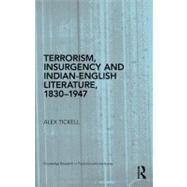- ISBN: 9780415877152 | 0415877156
- Cover: Hardcover
- Copyright: 12/21/2011
This book is an interdisciplinary study of representations of terrorism and political violence in the fiction and journalism of colonial India. Focusing on key historical episodes such as the Calcutta "Black Hole," the anti-thuggee campaigns of the 1830s, the 1857 rebellion, and anti-colonial terrorism in Edwardian London, it argues that exceptional violence was integral to colonial sovereignty and that the threat of violence mutually defined discursive relations between colonizer and colonized. Moving beyond previous studies of colonial discourse, and drawing on contemporary analyses of terrorism, Tickell examines texts by both colonial and Indian authors, tracing their contending engagements with terrorizing violence in selected newspapers, journals, novels and short stories. The study includes readings of several significant early Indian-English works for the first time, from dissident periodicals like Hurrish Chunder Mookerji#xE2;#xAC;"s Hindoo Patriot(1856-66) and Shyamji Krishnavarma#xE2;#xAC;"s Indian Sociologist(1905-9) to neglected fictions such as Kylas Dutt#xE2;#xAC;"s parable of anti-colonial rebellion "Forty-Eight Hours of the Year 1945" (1845) and Sarath Kumar Ghosh#xE2;#xAC;"s The Prince of Destiny(1909). These are examined alongside works by better-known Anglo-Indian authors such as Philip Meadows Taylor#xE2;#xAC;"s Confessions of a Thug(1838), Flora Annie Steel#xE2;#xAC;"s On the Face of the Waters(1897), Rudyard Kipling#xE2;#xAC;"s short fictions and novels by Edmund Candler and E.M. Forster. The study concludes with an analysis of Indian-English fiction of the 1930s, notably Mulk Raj Anand#xE2;#xAC;"s Untouchable(1935), and goes on to read Gandhi#xE2;#xAC;"s philosophy of ahimsa(non-violence) as a strategic response to a colonial and nationalist terror-politics.







